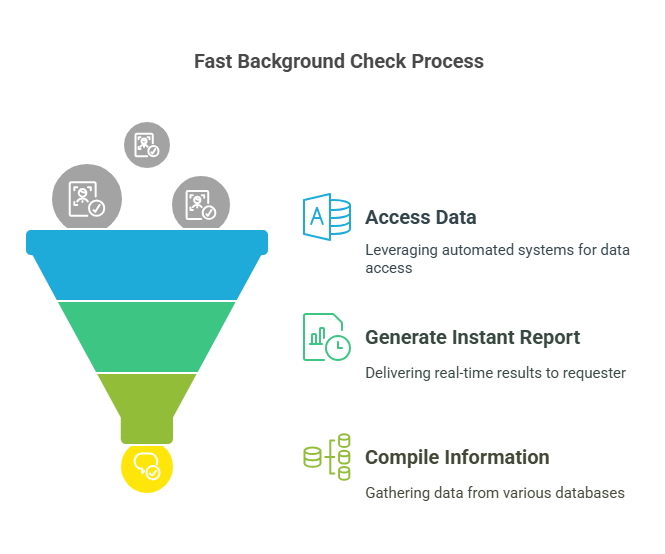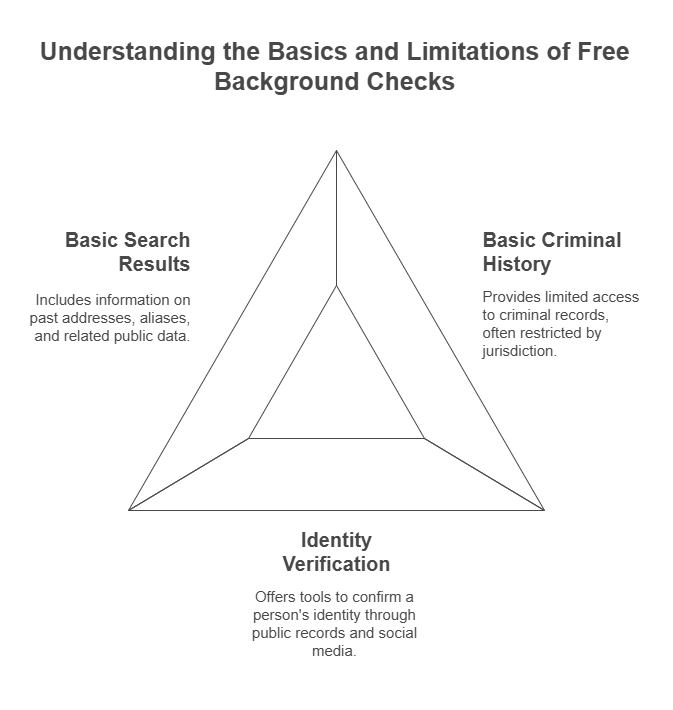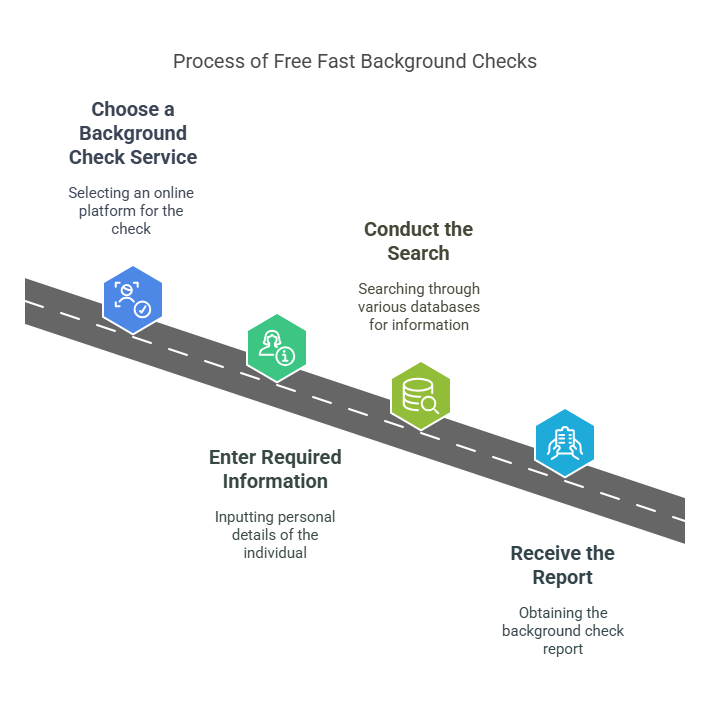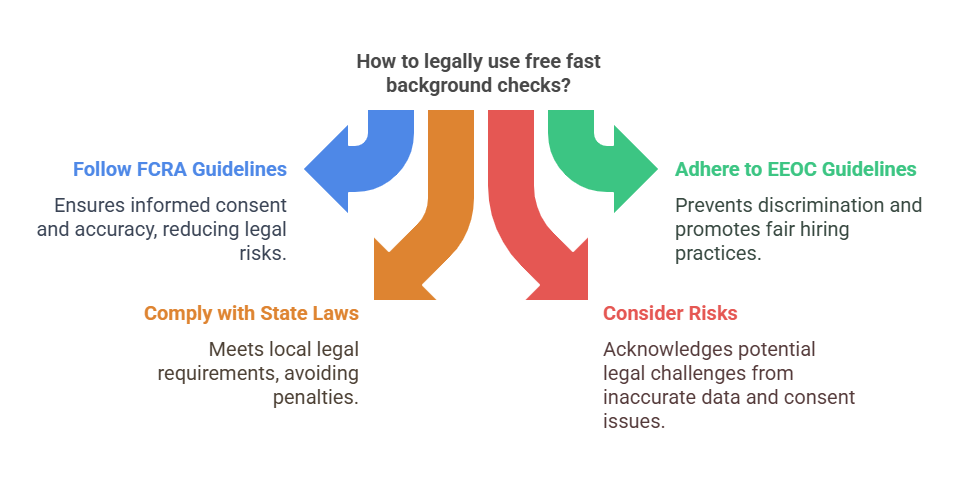Tips for Conducting a Fast Background Check for Free

Introduction to Fast Background Checks and Free Options
In today’s fast-paced world, quick access to information is often a necessity. Whether you’re hiring a new employee, screening a potential tenant, or simply conducting a personal search, speed matters. This is where fast background checks come into play. A fast background check allows individuals or businesses to quickly obtain key information about a person’s history, typically for the purpose of making informed decisions. In this article, we will explore what fast background checks are, how they differ from standard checks, and provide insight into free background check services—how they work, what they offer, and their advantages and disadvantages.
What is a Fast Background Check?

A fast background check refers to a background check that is completed quickly, usually within a matter of minutes or hours, compared to standard background checks that might take days or weeks to complete. Fast checks are typically processed using online tools and databases, which allows for near-instant access to key information, such as criminal records, employment history, and other relevant data.
The key factors that make a background check “fast” include:
- Speed of Processing: Fast background checks leverage automated systems that can access vast amounts of data instantly.
- Instant Reports: Some fast background checks deliver the results in real-time, providing immediate feedback to the requester.
- Online Platforms: Many fast background checks are conducted via online services that compile information from various public and private databases, making the process efficient.
While these checks can be completed quickly, it’s important to understand that speed often comes with trade-offs. A fast check might not be as comprehensive or detailed as a traditional background check, which could affect its accuracy and reliability.
Why Are Background Checks Important?
Background checks serve as a valuable tool for assessing the suitability of individuals for various purposes. Whether you’re an employer, landlord, or individual, background checks provide critical insights into a person’s history and can help reduce risks. Here are some common reasons why background checks are conducted:
- Employment Screening: Employers use background checks to verify candidates’ employment history, criminal background, credit history, and qualifications.
- Tenant Screening: Landlords conduct background checks on potential tenants to ensure they have a history of paying rent on time and are unlikely to cause problems.
- Personal Use: Individuals may use background checks for a variety of personal reasons, such as verifying the identity of someone they are dating or ensuring a contractor has a clean record.
Background checks help to mitigate risks by uncovering potential red flags, such as criminal convictions, fraudulent activity, or misrepresentation of qualifications.
Free Fast Background Checks: What You Need to Know

While there are many services offering background checks, some of them provide free trials or free versions of their checks. These free fast background checks can be very attractive, especially for those looking for a quick and inexpensive solution. However, it’s important to know what these free services offer and where they fall short.
Free background checks typically include:
- Basic Criminal History: Some free services offer access to criminal records, although the information may be limited to certain jurisdictions.
- Identity Verification: Many free background check services offer tools to verify a person’s identity, which may include checking public records or social media profiles.
- Basic Search Results: Information on a person’s past addresses, possible aliases, and related public data may be available.
Despite the appeal of free fast background checks, it’s important to be aware of the limitations of these services. They often do not provide the depth or breadth of information needed for high-stakes decisions like employment or tenant screening.
Advantages and Disadvantages of Free Fast Background Checks
To make an informed decision about whether to use a free background check service, it’s important to consider both the advantages and disadvantages. Below is a comparison of the key benefits and drawbacks of using a fast background check for free:
| Advantages | Disadvantages |
|---|---|
| Immediate Results: Free fast background checks often provide instant access to basic data. | Limited Scope: Free checks are often restricted in the depth of information they provide, such as criminal history, financial records, and employment verifications. |
| Cost-Effective: The obvious advantage of using free checks is that they don’t cost anything, making them ideal for quick, low-stakes queries. | Accuracy Concerns: The data provided by free services might be outdated, incomplete, or inaccurate due to limited access to comprehensive databases. |
| Convenient: Free fast background checks are easy to access online and can be done without leaving your home or office. | Lack of Detailed Checks: Free background checks may not include thorough criminal background checks, financial histories, or in-depth employment records. |
| Quick Decision Making: With fast results, you can make decisions quickly, especially in situations where time is of the essence. | Legal Limitations: Free services may not always comply with the Fair Credit Reporting Act (FCRA) or other legal requirements for background checks, making them less suitable for employment or tenant screening. |
| No Commitment Required: Many free trials or services don’t require long-term commitments, offering flexibility for users who only need a one-time check. | Risk of Incomplete Data: The free reports may not contain all the essential data needed to make informed decisions, leading to potential mistakes or omissions. |
Examples of Common Free Fast Background Check Services
There are several online services that provide fast, free background checks. While these services can be useful for certain purposes, it’s important to verify that the results are accurate and comprehensive enough for your needs. Some popular free fast background check services include:
- Instant Checkmate: Offers a free trial that includes access to limited background check data, such as criminal records and identity verification.
- TruePeopleSearch: Provides basic information about a person, such as their address history, phone numbers, and criminal history, without requiring payment.
- Whitepages: Offers free basic background checks that include phone numbers, addresses, and limited criminal history information.
- BeenVerified: Offers a limited free search with the option to pay for more detailed reports, such as full criminal and employment history.
These services can give users quick access to basic data, but they may not provide the full depth or reliability required for important decisions like hiring or renting.
How Free Fast Background Checks Work

Free fast background checks are typically conducted through online services that aggregate public data from various sources, such as government records, court databases, and social media platforms. These services aim to provide quick access to information, often in real-time or within a few minutes, to facilitate quick decision-making.
Here’s a step-by-step breakdown of how the process generally works:
Step 1: Choose a Free Background Check Service
There are various online platforms that offer free fast background checks. The first step is selecting a service that provides the type of information you need. While many services claim to offer free searches, you may find that the results are limited or only accessible after providing personal details or creating an account.
Step 2: Enter the Required Information
Once you’ve chosen a service, you’ll typically need to enter identifying information about the person being checked, such as:
- Full name
- Address
- Date of birth
- Email or phone number (in some cases)
In some instances, services may offer name-based searches without requiring additional identifying information, but this may limit the search’s accuracy.
Step 3: Conduct the Search
The background check service will then search through various public and private databases, aggregating information such as:
- Criminal records: If available, this includes any arrest records, convictions, or court cases.
- Address history: This shows the person’s previous and current addresses.
- Contact information: Some services provide phone numbers or email addresses associated with the individual.
- Social media information: A few services look into public social media profiles or news mentions.
Step 4: Receive the Report
After completing the search, the background check service will provide you with a report. For free fast background checks, the report will typically be available almost immediately, or within a few minutes, depending on the complexity of the search and the service used.
While the report will provide a snapshot of the person’s history, it may be incomplete, or the data might be outdated. For more comprehensive results, many services offer the option to pay for an in-depth report or subscribe to a premium plan.
What Information is Included in a Free Background Check?
Free fast background checks usually focus on basic public information and may provide insight into the person’s identity, criminal history, and other details. However, the depth of the report can vary based on the service provider and the available data. Below is a breakdown of the information you can typically expect to find in a free fast background check:
1. Criminal History
Free services may offer access to criminal records, but this is often limited to the most recent cases or certain jurisdictions. For example, a background check might show:
- Arrests: Records of arrests may be included if they are publicly available.
- Convictions: Some services may provide conviction details, though the comprehensiveness of this data varies by jurisdiction.
- Pending cases: In some cases, free services may include pending criminal cases, though this is not always guaranteed.
2. Identity Verification
Most background check services offer a form of identity verification, which might include:
- Social Security Number (SSN) verification (if publicly available or provided by the user).
- Alias and other name variations: If the person has used other names in the past, these may be included in the report.
3. Address History
Free checks often include past addresses linked to the person being checked. These can help verify whether someone has been truthful about their whereabouts or residency.
4. Contact Information
Some services may also provide contact information associated with the person, including phone numbers and email addresses that are tied to their history.
5. Social Media and Online Presence
Certain free services perform a quick social media search, which may show links to publicly available online profiles on platforms like Facebook, LinkedIn, or Instagram.
While this data can provide insight into a person’s background, free fast checks generally lack financial history, education verification, and detailed employment records, which are often only available through paid services or formal background checks.
Limitations of Free Fast Background Checks
While free fast background checks can be convenient for obtaining quick insights, there are some notable limitations you should be aware of:
1. Limited Access to Comprehensive Databases
Most free services do not have access to the same robust databases as paid services or professional background check providers. As a result, they may miss crucial information, such as:
- Detailed criminal records: Free services may only show limited criminal data, leaving out important court cases or convictions.
- Employment verification: Many free background checks do not verify a person’s work history.
- Financial records: Checking for bankruptcies, liens, or credit reports typically requires a paid service or access to a more specialized database.
2. Inaccurate or Outdated Information
Since free fast background checks often pull data from public records, some information may be outdated or incorrect. For example, criminal records may not be updated regularly, or the service may include data from a different person with the same name or similar details.
3. Lack of Legal Compliance
Free background check services may not comply with key legal standards, such as the Fair Credit Reporting Act (FCRA), which governs the use of background checks in employment and tenant screening. Without this legal compliance, using the results of these checks for employment decisions or tenant approvals could expose businesses or individuals to potential legal risks.
Best Practices for Using Free Fast Background Checks
If you choose to use a free fast background check, here are some best practices to ensure that the results are used appropriately and effectively:
1. Verify Multiple Sources
Given the potential inaccuracies of free fast checks, it’s important to cross-check results across multiple platforms. Use different background check services and consult additional sources, such as official government records or court websites, to confirm the findings.
2. Be Aware of Legal Limitations
If you’re using the results for employment or tenant screening purposes, ensure you are compliant with all relevant laws and regulations, including the FCRA and EEOC guidelines. Free background checks may not always meet these requirements.
3. Understand What You’re Getting
Before using a free service, read the fine print and understand the scope of the check. Be aware of what information is included and what might be missing. If the check is for a serious decision (e.g., hiring or renting), consider paying for a more thorough, professional background check.
4. Verify Information
If any red flags appear during the background check, such as a criminal history or employment discrepancies, make sure to verify the information from multiple credible sources. It’s essential to ensure the data is up-to-date and accurate.
5. Use Professional Services for High-Stakes Decisions
For employment or tenant screening, always opt for a comprehensive background check service that provides verified, legal, and accurate data. Consider using Precise Hire, a trusted provider of thorough and legally compliant background checks that ensure full accuracy and reliability.

